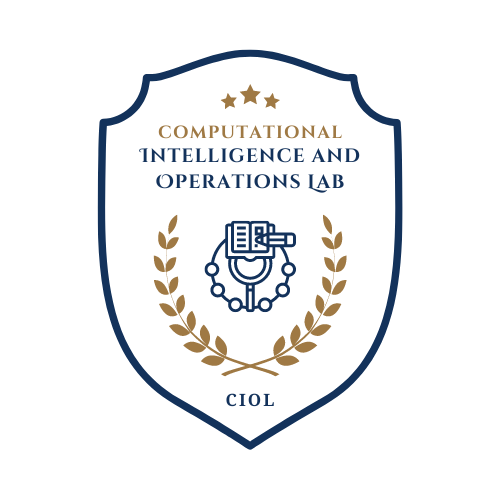Research Wings
🚇 Operations Research with ML (OR+ML) Wing
Traditional optimization techniques in Industrial and Production Engineering (IPE) provide a robust foundation for solving complex problems and challenges of modern supply chains and manufacturing systems. By integrating machine learning (ML) with optimization, we can unlock new possibilities for enhancing efficiency, decision-making, and process improvement across various domains. CIOL focuses on this intersection, leveraging the strengths of both fields for groundbreaking research. Our goal :
- Develop ML-powered algorithms that efficiently solve complex optimization problems within the constraints of intricate industrial settings.
- Use ML to analyze industrial data, build better optimization models, and improve decision-making under uncertainty, leading to increased profitability.
- Fuse ML models with traditional optimization techniques to create powerful hybrid methods that maximize the strengths of both approaches.
- Develop AI-powered forecasting models to optimize inventory management, production scheduling, and resource allocation in supply chains.
- Create AI-driven risk assessment tools to proactively identify and mitigate disruptions within complex supply chain networks.
- Utilize graph neural networks to optimize transportation routes, improve network resilience, and analyze the inter-connectivity of supply chains.
🤖 Digital Twin and Physics-Informed Machine Learning (DTP) Wing
The Digital Twin and Physics-Informed Machine Learning (DT-PIML) Wing aims to bridge the gap between physical systems and their virtual counterparts, combining state-of-the-art simulation technologies with data-driven models. Digital Twin technology offers precise virtual replicas of real-world systems, allowing continuous monitoring, optimization, and predictive maintenance. By integrating physics-based principles with machine learning, this wing focuses on enhancing model accuracy and robustness, especially in complex industrial and engineering applications. Our goal :
- Develop advanced Digital Twin models to control, optimize, simulate and monitor different systems in real time.
- Develop advanced AI Agents to control, optimize, simulate and monitor different systems in real time.
- Incorporate physics-informed machine learning techniques to improve model reliability and performance in scenarios with limited or noisy data.
- Explore the application of Digital Twins in diverse sectors, such as smart manufacturing, energy systems, supply chains, and medical AI.
🕵️♂️ Human Machine/AI Interaction and AI Ethics, Fairness and Transparency (HMAI) Wing
In our IPE curriculum, the dept. offer various courses spanning ergonomics, human factors engineering, behavior studies, psychology, and more. We've identified a considerable opportunity for multidisciplinary research by integrating these disciplines with AI or computer-related domains, particularly in HCI with AI. Surprisingly, there has been limited activity in this field in Bangladesh. Given the rapid growth of human-computer interaction (HCI), we have collectively decided to explore and advance in this area with AI. Our works are focused on:
- Developing and Evaluating Human-AI Interaction Systems
- Developing Human Machine/Robotics Interaction Systems
- Evaluating Computer Human Interaction Systems
- Exploring AI-assisted HMI/HCI/CHI Systems
- Ergonomics, Safety and Bias in Interaction Systems
⚙️ Applied Machine Learning (AML) Wing
The AML wing focuses on using the power of machine learning to address real-world challenges within the Industrial and Production Engineering (IPE) domain. We specialize in a wide range of techniques, empowering us to analyze complex industrial data and develop innovative solutions that drive efficiency and optimization. Our goal :
- Apply statistical and traditional machine learning methods to tackle diverse industrial challenges.
- Utilize deep learning to analyze image, video, and sensor data for predictive maintenance and quality control.
- Develop advanced forecasting models to predict trends in production, supply chains, and demand, facilitating proactive decision-making.
🔠 Bangla Language and NLP (BNLP) Wing
In our NLP with Bangla Language Wing, we're pioneering the exploration of natural language processing in Bangla - our mother tongue and national language. Through developing and evaluating NLP models and constructing Bangla knowledge graphs, we're paving the way for advancements in linguistic understanding and technology in the Bengali language. Our goal :
- Develop and refine Bangla NLP techniques for tasks such as text classification, sentiment analysis, and machine translation.
- Create robust evaluation methods to assess the performance of Bangla NLP models and systems.
- Working on Bangla Knowledge Graphs to work with complex relations between words and concepts, enabling intelligent semantic applications.
💉 Medical AI and Informatics (MedAI) Wing
In our Medical AI and Informatics Wing, we are at the forefront of integrating artificial intelligence into healthcare, revolutionizing medical research and practice. Through developing advanced AI models for drug discovery, protein analysis, medical image analysis, diagnostics, and patient-human-computer interaction (HCI), we aim to enhance the efficiency and accuracy of medical processes and patient care. Our goals:
- Innovate AI-driven techniques for drug discovery and protein analysis to accelerate the development of new treatments and understand biological mechanisms.
- Enhance medical image analysis to improve the accuracy and speed of diagnosing conditions using AI.
- Develop AI-based diagnostic tools to support healthcare professionals in making precise and timely decisions.
- Improve patient-human-computer interaction (HCI) to create more intuitive and accessible healthcare technologies.
CIOL is always looking for strong, self-motivated, and hardworking research students and collaborators. If you are interested in joining or collaborating the lab, please email your CV and a short personal description with your research interests to ciol.management@gmail.com. Any student or researcher from any university can join us if the research areas are aligned. We are open to all.
